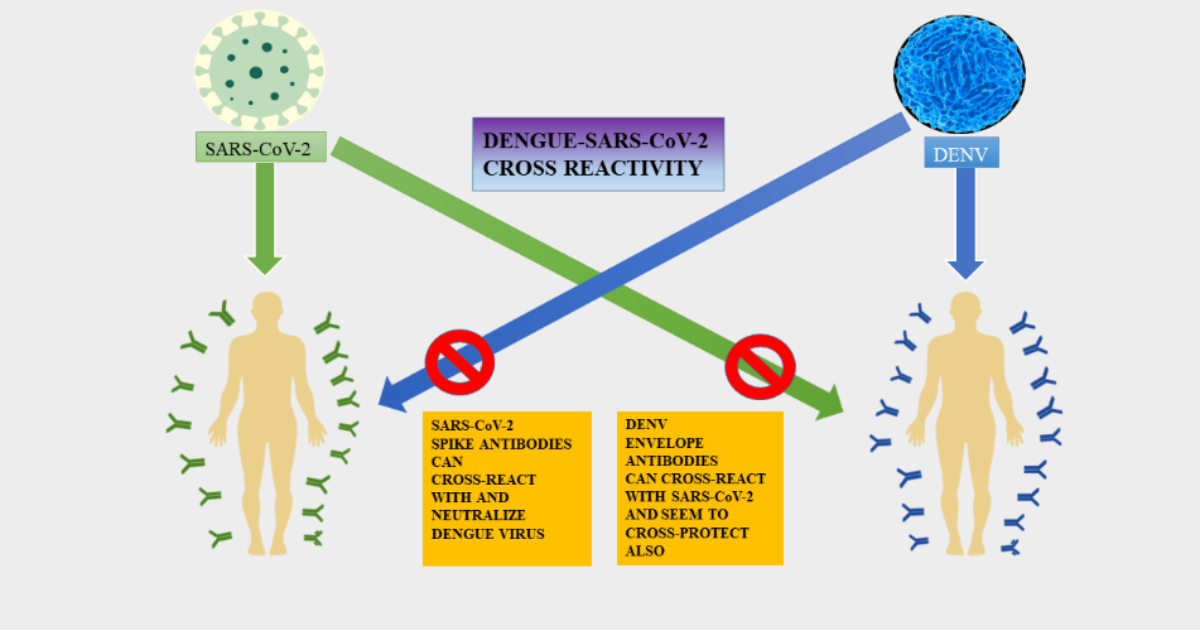

New Delhi, March 13 (India Science Wire): Researchers from the National Institute of Pharmaceutical Education and Research, Kolkata, and CSIR-Indian Institute of Chemical Biology (CSIR-IICB), Kolkata, have recently found that the severity of COVID-19 to be less in dengue-endemic countries and vice versa, especially during the active years of the pandemic (2019-2021).
A team comprising Debrupa Dutta, Anisa Ghosh, Chiroshri Dutta, Soumi Sukla, and Subhajit Biswas has recently shown that dengue virus antibodies could cross-react with SARS-CoV-2 spike antigen, resulting in false SARS-CoV-2 positivity in COVID-19 rapid antibody test kits.
“Computational study has revealed that dengue antibodies can bind to SARS-CoV-2 receptor-binding domain and vice versa; i.e., SARS-CoV-2 spike antibodies can bind to dengue virus envelope, which further validated dengue virus and SARS-CoV-2 cross-reactivity”, informed the researchers, while talking to India Science Wire.
The study has also shown that SARS-CoV-2 antibodies could cross-neutralize dengue virus serotype1 in virus neutralization test, even with no evidence of dengue pre-exposure. The same was later confirmed for dengue virus serotype2 by scientists from Taiwan. In an invited review article published in the Journal of Medical Virology (Wiley Online Library), the researchers have consolidated all the studies in this area from their lab and other labs worldwide. It was found that antibodies to other pathogens like Plasmodium were also cross-reactive but non-neutralizing for SARS-CoV-2.
The team has tried to present a clear insight into the cross-reactivity of SARS-CoV-2 with dengue, Zika and other pathogens, which are highly mystified with co-infection. “It needs more in-depth investigation towards understanding the disease dynamics and devising strategies of differential diagnosis and treatment management”, says the study team.
The cross-reactivity between dengue virus and SARS-CoV-2 may have varied implications in dengue-endemic countries. Cross-reactivity of dengue virus antibodies may lead to partial neutralization of SARS-CoV-2, thereby reducing the severity of COVID-19. On the other hand, despite the high specificity of the COVID-19 and dengue serological test kits, cross-reactivity issues can lead to false positive results which might lead to misdiagnosis and errors in sero-surveillance for both the viruses.
Clinicians must be well aware of the difference between cross-reaction and co-infection. A wrong diagnosis can be confusing if dengue is mistaken for COVID-19, which tends to increase blood pressure and blood clotting (thrombosis). On the other hand, dengue usually leads to lower blood pressure (due to plasma leakage) and reduced blood clotting (due to a drop in platelet count).The researchers are of the opinion that alternative approaches like SARS-CoV-2 nucleocapsid antibodies could be targeted for diagnosis of COVID-19 in different SARS-CoV-2 serological tests along with virus antigen test or RT-qPCR for virus RNA for a better differential diagnosis.
The researchers caution against false positive results because of this cross-reactivity between dengue and SARS-CoV-2. This is critical since the early symptoms of both diseases overlap, but the treatment/management of the diseases are different. Therefore, clinicians must be cautious and rely on combinations of COVID-19 tests, for instance, using other antibodies (like nucleocapsid)-based sero-diagnosis and/or virus nucleic acid/virus antigen tests. At present, combinations of NS1 antigen ELISA/RT-PCR and serological tests are more reliable options for laboratory diagnosis of dengue.
“Sero-surveillance data for both viruses will be inconclusive since both the viruses cross-react with each other to varying degrees. This is particularly relevant for countries like India, where both the diseases are co-endemic now”, informed the researchers. (India Science Wire)

